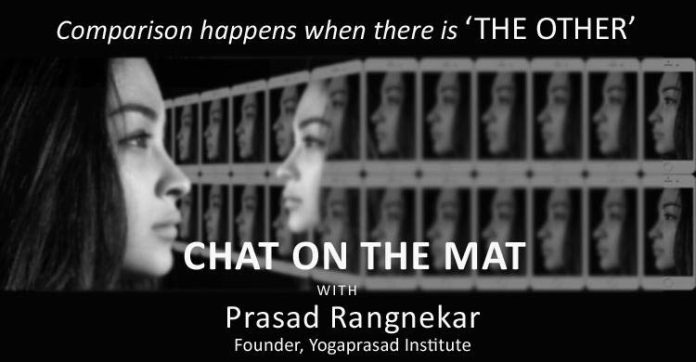Everyone is a unique being in this cosmos and so are their situations, emotions and life, even the external and internal environment. We all are aware of this fact but still consciously or unconsciously we do compare our lives, relations and positions with others. Why?
Most of the times this comparison is driven by our emotional state, isn’t it?
But is it right or wrong?
Why Stop Comparing Yourself to Others?
Let’s try to understand it with Prasad Rangnekar, founder of Yogaprasad Institute, RYS, and YACEP certified institute, Mumbai. Prasad, an ERYT 500 certified from Yoga Alliance, is an outstanding yoga mentor, educator, and speaker with a strong hand in transformative aspects of yoga. He is also a fitness expert and nutrition specialist. Prasad imparts self transformative teachings gained from his own learning and experience of over 35 years.
hmy: Why do people compare? Is it all about perception?
Prasad: Comparison happens when there is ‘the other’.
The other’ doesn’t have to be outside of you, it could also be versions of you, across time and identities. Eg: You may cherish how life was easier as a child vis a vis as an adult, or someone may feel that married life is better than being single, and so on.
I feel people compare because they are not happy with where they are and how they are.
Inner discontent is an impulse that generates a comparison mindset. The more the discontent, the more we compare. In a deeply content state of mind ‘the other’ is not perceived as a threat or a competition. That is when one appreciates ‘the other’ for who they are without judging, comparing, or rivaling.
hmy: Is comparison good or bad?
Prasad: I think comparison is neutral, not necessarily good or bad per se. In fact, evolutionary psychologists would say that emotions (like jealousy) that emerge out of comparison are an evolutionary response that increased our chances of survival.
Comparison gives us raw data, what we do with that data determines the good or bad. When we make self-growth statements like ‘I want to be better than where I was last year..’ we are comparing ourselves to our earlier versions and pushing our boundaries to help us grow, evolve. But, if we compare and use the data for thinking or doing bad things to others, say out of jealousy or greed, then comparison becomes a bad thing.
As Shri Krishna says in Bhagavad Gita (16:21), greed (that emerges out of comparison) is one of the gates to hell.
hmy: Where should we compare and where shouldn’t we?
Prasad:
My personal filter is Krishna’s suggestion in Bhagavad Gita (5:11). He says that Yogis act with detachment for purification of the mind to come out of spiritual ignorance. Anything that one encounters in life, if channeled towards self-growth (and also the growth of others) becomes ‘good’, and the contrary becomes bad. So, comparison could be good if channeled for spiritual self-growth.
Eg: When we see someone diligently doing their Sadhana, we could reflect on our own dedication and use the comparison to inspire ourselves.
hmy: How do you think our attitude and behavior change with comparison?
Prasad:
I do not categorize comparison as something bad per se, it depends on the proclivity of the mind – the Svabhava. Comparison is the proverbial double-edged sword. If channeled positively, it can help us grow and evolve.
If not, it can bind us tightly to Avidya (ignorance of self). In its negative context, comparison can perpetually keep us in a state of lack and anxiety of loss – the FOMO, as they say. A FOMO mindset not only clouds our judgment but also hampers our vision of life.
hmy: Does it cloud our mind with fake reality?
Prasad: A constantly comparing mindset limits self-growth and could create esteem issues. It projects a reality that stems out of a sense of inner-lack. Such projections don’t let us see things for what they are.
In popular culture the ever-changing ideas of attractiveness that dominate social media keep us in a constant state of comparison, thus fueling consumerism. Our lack of contentment becomes a part of someone else’s business model.
The projected reality works in social relations too. We may end up judging someone, or even not liking someone for being in a better place than us (financially, professionally, etc.) but, when we get to interact with that individual, we may find out that she/he is anything other than what we perceived them to be. Such revelations (that I am sure many of us have had) could then make us feel guilty, perpetuating a jealousy-guilt cycle. It is not a nice place to be in.
hmy: Comparison becomes an unconscious habit in all social beings. How to break his habit & use it for our own goodness?
Prasad:
My two tips on breaking the unconscious habit of comparison are,
- Remember to be grateful for what you have. A comparative mindset always points to what we don’t have. Generating a gratitude practice, reminding ourselves of our privileges, and not taking them for granted would be a good start.
- Focus your energy on generating contentment instead. One could try to consciously redirect a comparing mindset to focus on generating contentment. This can be done at two levels, by cutting the train of comparing thoughts by focusing on the breath and, later, over a period of time, by generating deep inner contentment through Sadhana and Study.
hmy: Does it facilitate self-awareness?
Prasad:
If the seeker is mindful enough, then she/he can regulate a limiting comparative mindset using the above methods. If not, I believe a mind that is constantly running around comparing itself with others will one day give up out of exhaustion and start asking fundamental spiritual questions. These questions could open the door to an evolved vision of life and self.
hmy: Can our energies be channelized to curb negativity arising from comparing?
Prasad: Yes, what the energy produces depends on the intent that drives it.
Emotions change us, but they can also be changed. Emotions are like breath, they work unconsciously, but if we become conscious of them, they can be regulated and channelized towards the betterment of self and society.
Ultimately, Yoga is all about respecting everyone’s individual uniqueness and also recognizing the fundamental oneness. Becoming comfortable and content in one’s own skin helps reduce negativity and conflict that emerges from a comparative mindset.



